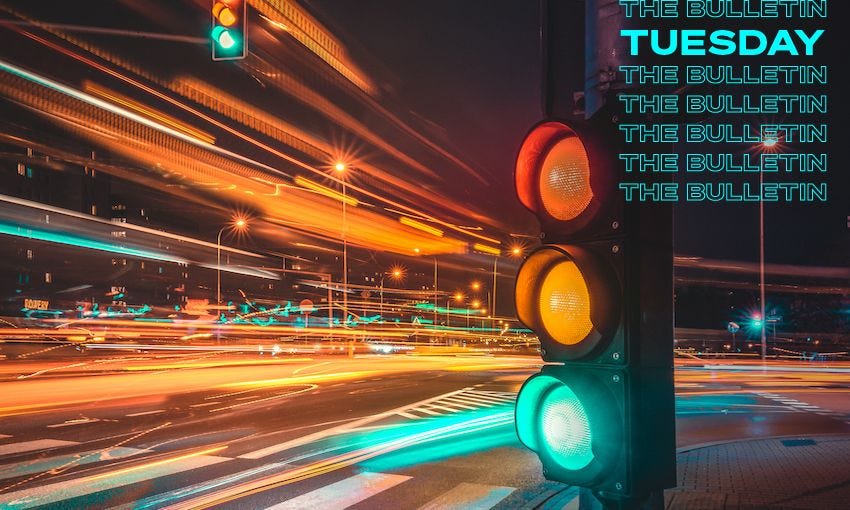Goodbye alert levels, hello traffic light
There will be a momentous shift in the country’s pandemic approach next week, doing away with eliminating the virus and instead trying to chart a way to live with Covid-19
Mōrena and welcome to The Bulletin for Tuesday, November 23, by Justin Giovannetti. Presented in partnership with Z Energy.
In today’s edition: Marsden Point refinery to close; Groundswell protest vows to continue; Southland coal mines shrug off global ‘phase down’; but first, just over a week to the traffic light system.
The traffic light system will change much of how Covid-19 is managed (Getty Images)
Red, orange and green. Borrowing a phrase from overseas, New Zealand now has a freedom day: December 3. On that day next week the alert level system will become history and the country will move to the new traffic light system. It’s a momentous shift for the country’s approach to Covid-19. As Stuff reports, the new system doesn’t have any national lockdowns or mass school closures built into it. For the vaccinated, life going forward will have about the same level of freedoms under the strictest red setting as under level two currently. However, for the unvaccinated, most New Zealand businesses other than supermarkets and pharmacies will become off-limits from next week.
“The hard truth is that delta is here and not going away, but New Zealand is well set to tackle it because of our high vaccination rates and our latest safety measures,” the prime minister said yesterday.
Cabinet will announce next Monday what colour each region will move to. Auckland is headed to red, every other region will be either red or orange depending on local vaccination levels, active cases and other factors.
A preview of what’s to come. The new traffic light system depends on vaccine passes, which have now been downloaded by more than one million New Zealanders. To help test the system, Auckland hairdressers and barbers can open from this Thursday as long as fully vaccinated clients with vaccine passes book a spot. The NZ Herald reports that the scissors and clippers of the city are sure to be busy taming many unruly locks after nearly 100 days of lockdown.
A reminder of how the traffic light system works. Alice Neville has written an explainer for The Spinoff about how the new traffic light system works. It’s sure to help clear up some confusion. Based on new polling from Newshub, two-thirds of New Zealanders don’t quite understand the traffic light framework. However, some of the uncertainty might be warranted. The actual legislation necessary for the system is only expected to be introduced in parliament later today and will be pushed through the chamber by Labour’s majority with minimal debate this week. Analysis from the Ministry of Justice of how the system will comply with the Bill of Rights hasn’t been made public yet. This is far from unprecedented in the era of Covid-19, but it’s poor law-making.
International travel wasn’t mentioned yesterday. The government still hasn’t unveiled plans for when Aotearoa can connect with the world, much to the disappointment of New Zealanders overseas. Air New Zealand responded by cancelling most of its scheduled flights to Australia between now and Christmas, nearly 1000, according to Stuff. Across the Tasman, Australia is moving ahead with plans to open up its borders further. As ABC reports, fully vaccinated international students and workers holding visas will be allowed to travel to Australia from next week, along with tourists from Japan and South Korea.
A message from The Spinoff’s new editor Madeleine Chapman:
Like any good door-to-door salesperson, I’m about to cheerily introduce myself and then, in the very next breath, ask you for money. Hi! I’m Madeleine (or Mad) Chapman, previously an intern at The Spinoff, then a staff writer, senior writer and now editor. It certainly wasn’t the plan to step into this role in the middle of a delta outbreak, nor did I think my first weeks on the job would unfold alongside New Zealand’s largest city slowly coming out of stagnation. But despite the strange and unfortunate circumstances, The Spinoff team has stepped up once again, working tirelessly (and mostly from our bedrooms) to bring you the most important news when you need it, and the lighter moments when things are looking a little bleak. We’ve been able to continue this work because of the ongoing contributions from our members and I can’t thank you enough.
But can I boldly ask that you consider becoming a member if you aren’t one already? If you’ve read something on our site recently that you enjoyed or appreciated, consider it a koha for that alone, because every dollar donated through The Spinoff Members is used to create more of the work you see every day. With Christmas around the corner (which I’m finding genuinely hard to believe), there’s no such thing as shipping delays on a membership of The Spinoff bought for whānau and friends.
Marsden Point refinery to close after 60 years. Once a symbol of industrial New Zealand, the country’s only refinery near Whangārei will be transformed into a tank farm next April. While there had been concerns raised by the pending lack of local refining capacity, the consortium that owns the site has voted to move ahead with the conversion, BusinessDesk reports. The refinery has brushed aside concerns about lost jobs, citing the demand for skilled workers across the motu.
The Covid numbers: A man in his 40s died of Covid-19 yesterday. There are 85 cases in hospital and 6 in ICU/HDU. There are now 7,054 cases in the delta outbreak. 175 new community cases were reported in Auckland yesterday, 20 in Waikato, 5 in Bay of Plenty, 4 in Northland and 1 in Taupō. 9,851 people were vaccinated on Sunday (the slowest vaccination day since July).
The Spinoff’s Covid data tracker has the latest figures.
Groundswell protests to continue, group vows. Organisers for the farmer-led protest are headed to parliament on Thursday, according to Farmers Weekly. A protest in the capital is planned for next year, due to concerns over the three waters package and planned climate rules. They could find an unlikely ally in Green MP Chlöe Swarbrick, Newshub reports. The central Auckland MP has said that farmers “should be angry” just not at the government, but at rural leaders who have delayed making tough decisions towards building climate resilience.
There’s no coal ‘phase-down’ on the South Island. The Southland Times reports that the region’s two largest coal miners are making no changes to their long-term plans, despite the government signing a climate commitment at Cop26 to “phase-down” coal. One of the companies says it has plans to operate until 2037, another into the 2040s, with coal leaders saying that they understand the government’s pledge to only apply to heavy coal users and not New Zealand. Meanwhile, the Cooks Islands PM told RNZ that the world owes his country a ‘climate debt’ and needs to pay up after dragging its feet on real climate action.
Wellington’s electric ferry to zip across the harbour by Christmas. The southern hemisphere’s first battery-powered ferry is currently docked in Seaview, across the harbour from Wellington, waiting to enter service (and has been for months). As Stuff reports, the capital’s boat building industry collapsed two decades ago, but it’s now back and could ride a new electric future. Other companies across New Zealand are looking to join in.
Airbnb has suspended a host who left racist messages in Ōtautahi rental. A Tweet over the weekend shocked many in Aotearoa after an Airbnb host posted notices in a flat that te reo Māori wasn’t to be spoken by paying guests. According to Pou Tiaki, the host has been suspended and guest reimbursed. The race relations commissioner said to “blatantly discriminate and to be racist about it, is just not on”.
Got some feedback about The Bulletin, or anything in the news?
Get in touch with me at thebulletin@thespinoff.co.nz
Right now on The Spinoff: Perzen Patel argues why you should ditch your spice rack for a masala dabba. Toby Manhire looks at how NZ regions are bracing for a Covid summer as Aucklanders prepare to travel. Barry Coates writes that we can all choose to stop investing in fossil fuels in a meaningful way. Sam Brooks has found all the Auckland locations that turn up in Cowboy Bebop. Chris Schulz asks why the funniest show on TV isn’t available here.
NZ rowers eye shorter course at 2028 Olympics. New Zealand’s most successful Olympic sport is rowing, with the country winning 29 medals and 14 gold finishes on the water. As One News reports, the rowers are now preparing for a 2000 metre course that will actually be 500 metres shorter at the 2028 games in Los Angeles. The response so far is a mixture of arms in the air and getting the paddles ready.
That's it for The Bulletin. If you want to support the work we do at The Spinoff, please check out our membership programme.







